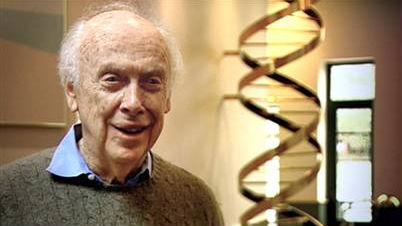James Watson: There Are Definitely Genetic Differences in Intelligence

Dr. James Watson can’t help but speak his mind. And this has gotten the co-discoverer of DNA’s double-helix in trouble in the past. He has been called, among other things, sexist, racist, and elitist. He retired from his role as Chancellor of Cold Spring Harbor Laboratory in 2007 after claiming that black people are genetically less intelligent than whites.
In his Big Think interview, Watson reasserted that there are definitely genetic differences in intelligence. But he says we don’t know very much about these differences though because psychology is “totally dominated by political correctness.” And because we are unwilling to pinpoint people who are unable to learn, we are “avoiding maybe learning somehow and someday to make out brains work better,” he says. “Political correctness has never been a way toward the truth. It’s like, you know, saying something is religiously correct.”
Watson also discussed the key breakthroughs in the search for the double helix back in the 1950s. He also cleared up the role that fellow Cambridge biophysicist Rosalind Franklin played in the discovery. She did, he admits, contribute some crucial pieces of information, but she was adamantly against the idea of DNA being a double helix. Her great handicap (likely a form of Asperger’s syndrome) was that she could not deal with other people or ask for help, Watson says. “If she’d come out to Cambridge and shown her data to Crick, Crick quickly would have told her how to solve her problem.”
A half-century after Watson’s DNA discovery, scientists are finally able to map a whole human genome. Craig Venter, whom Watson calls “a great marketer,” was the first to have his genome mapped, but Watson was the second. And he learned a couple of important things about his genetic predispositions. First of all, he discovered he metabolized certain drugs more slowly than most people, which could prove a risk if he took to many of them. If he were given an anti-psychotic, for instance, it could potentially kill him. He also learned that he was lactose intolerant, which explains the constant stomach pains he had while he was working out the DNA structure. He thought his condition was a result of nervousness, not the quart of milk he was drinking each day.
In the last few decades, Watson has turned his focus from DNA to cancer, and he talked with us about some of the most exciting avenues currently opening up in cancer research. He also is deeply interested in mental illness, in part because his son suffers from schizophrenia. “The mentally ill are treated very cruelly,” he says. “We sort of deny their existence; Congress has virtually no interest in them.” Watson says that mental disorders like schizophrenia are entirely genetic, at least a predisposition for them. Whether or not they will progress to the full-blown disorder depends on environmental factors, including drugs. Marijuana, he says, can trigger schizophrenia in someone who is predisposed to the disease.





